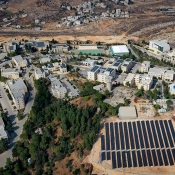Lecture Series Kicks off Lecture Series with Analyzing US Intervention in Libya
The Ibrahim Abu-Lughod Institute of International Studies, in cooperation with Council for British Research in the Levant, and as part of the "Advancing Research and Teaching in Political Economy in the oPt" project funded by the LSE, held the first lecture of the lecture series given by Professor Toby Dodge, a professor of International Relations at the London School of Economics and Political Science and Director of LSE’s Middle East Center.
This lecture, which was held on Wednesday, Nov. 02, 2016, and was entitled “Approaches to Foreign Policy: Obama’s Decision to Intervene in Lybia” tried to answer questions related to the logic that was behind the formulation of foreign policy during the decision making process of the US intervention in Libya in 2011. The lecture also examined the reasons that led to the US military intervention, and tried to explain such decisions using different approaches of foreign policy analysis.
In his lecture, Dodge introduced the audience to the levels of foreign policy analysis, explaining what motivates actors in the decision-making process and how their decisions are made. Describing the foreign policy making process as a very complex one, Dodge untangled its intricacies by reviewing three perspectives termed levels of analysis: The individual-level analysis, the institution-level analysis, and the system-level analysis.
Building on the foreign policy analysis basic approaches, mainly the rational approach, the bounded rationality, and the constructivist approach, Dodge analyzed the case of Libya and the US intervention in March, 2011. He then explained how and why Obama’s decision was made according to the Neo-Classical Realism, the Bureaucratic Politics approach, the Cognitive School and Constructivism, exploring the claims and problematics of each of these approaches.
Dodge emphasized that the USintervention in Libya was reactive and did not comprise action in pursuit of a strategic objective. In his point of view, Obama has adopted the responsibility to "protect", seeking radically to redefine the US identity that requires him to adopt the principles of the responsibility to protect and implement protection on an international stage.






